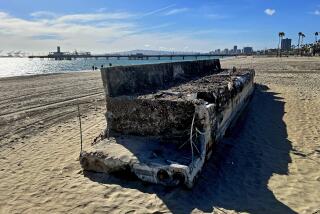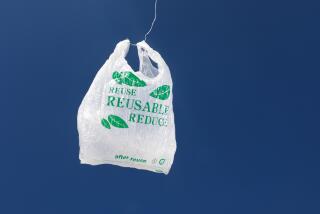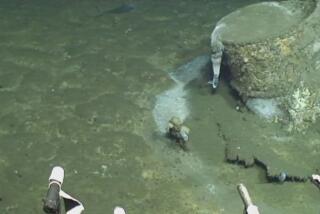The wrong kind of sea foam
Coastal cities can’t keep plastic foam out of the ocean by themselves. The tiny bits of polystyrene from food takeout containers float from inland areas through storm water channels along with the rest of the urban runoff.
So it’s heartening that legislation to ban most use of such containers managed to pass the state Senate in July despite strong opposition. The bill (SB 568) faces a more formidable hurdle in the Assembly Appropriations Committee, but it’s been improved with provisions that allow a slower phase-out of the foam, and it should be passed. It would reduce plastics pollution in the ocean without having a noticeable effect on restaurants and consumers.
Better known by the trade name Styrofoam, polystyrene is particularly difficult to remove from the environment because it readily crumbles into ever-smaller pieces. Coastal cities in California face stringent water-quality rules that require them to keep all plastic trash out of the ocean, but the minuscule pieces of polystyrene pass easily through the screens designed to filter garbage from water channels. Relatively few cities accept polystyrene for recycling, and when it has been used to hold food, it must be cleaned first.
The Senate’s version of the bill would have banned polystyrene from takeout containers as of Jan. 1, 2014, but the current version would give cities until 2016 to recycle at least 60% of the foam used by restaurants, or to ban the substance outright. Schools would be given an extra 18 months to comply. The polystyrene-manufacturing industry has been saying all along that recycling, not replacement, is the answer; the bill would give it the chance to prove its theory by helping municipalities reach the 60% goal.
In truth, California can live very easily without plastic foam. About 50 municipalities already have done away with it without causing eateries to close or noticeably raising the price of restaurant food. If McDonald’s can use more environmentally friendly containers — the only polystyrene it has used since 1994 are the foam cups for hot beverages — so can other eateries.
Nor is the bill a job-killer. There already are more jobs in California for the manufacture of alternative food containers — cardboard, aluminum or recyclable or reusable plastic — than for foam containers. The industry is well-established in the state and ready to grow when demand increases.
The Los Angeles City Council is considering whether to support the bill, which goes before committee on Wednesday. That support is seen as crucial to persuading key Assembly members. Reducing foam trash is good for the city, the state and the ocean that Californians cherish. The council should support the bill and the Assembly should pass it.
More to Read
A cure for the common opinion
Get thought-provoking perspectives with our weekly newsletter.
You may occasionally receive promotional content from the Los Angeles Times.






